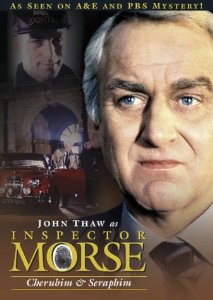
CHERUBIM AND SERAPHIM
UK, 1992, 100 minutes, Colour.
John thaw, Keven Whately, Jason Isaacs, Sorcha Cusack, Isla Blair, Anna Chancellor.
Directed by Danny Boyle.
Cherubim and Seraphim is the most personal of the Inspector Morse series. Here we discover that his father left home, that he stayed with his mother, at her death he went to his father with his new wife and their daughter. While he loved the daughter, he contemplated suicide, making a huge list, seeing that if he could make such a list, he could do better with his life and joined the police force.
There are quite a number of scenes or with Morse talking about his past, especially in explaining it to Lewis.
Morse becomes involved when Joyce’s daughter commits suicide and he has to investigate the youth culture, the death of another young person, drugs and the rave parties.
The villain of the piece is played by a young Jason Isaacs, a research scientist on an anti-ageing process who supplies drugs to the rave parties, drugs giving those who take them a heightened sense of reality, seeing so clearly that there was nothing left but to opt out of life.
This episode was written by Julian Mitchell, author of 10 of the Morse films. It was directed by Danny Boyle who also directed The Masonic Mysteries, went on to make Trainspotting and become a celebrated director, winning the Oscar for Slumdog Millionaire in 2009.
1. The popularity of the long-running series? Television movies? With style? The popularity of Morse and his personality, enigmatic and mannered style? The personality of Lewis? Their relationship? The solving of the crimes? Intricacy of the plot? The psychological dimensions, the mystery and clues? Police work and solving the mysteries with their own abilities? The work of Colin Dexter?
2. The Oxford settings, the city and landscapes, the cityscapes, the buildings? Comments about Oxford and Oxford society? The ironies about Oxford and the dons and scientists and research? The university city? Ordinary people? Their interconnections? So much beauty – and so much crime?
3. The quality of the mysteries, character-driven? Sufficient information, sufficient clues? The exploration of character and clues?
4. John Thaw as Morse, his personality, the changes over the years, yet remaining the same? The mystery of his name? His crusty manner, the bachelor (but romantic at times)? His own authority – exercised over Lewis – and his reaction to authorities? Promotion or not? The changing of his attitudes towards Lewis, bossing him, patronising him about education and culture? The issue of music? Drinking ale? His car? Quietly at home, at work? With Lewis, understanding the situations and characters, the deductions? His being a good listener – but critical?
5. The contrast with Lewis, the family man, the ordinary policeman, education and lack of education, doing revision and for his promotion, being assigned to another, by-the-book Inspector and clashing with him his being put down by Morse – but enjoying his comeuppance now and again? Music and his ignorance? The first reactions, Lewis being patient? His admiration for Morse, having to do so much leg work, to formulate hypotheses? Working under pressure? Collaborator and partner of Morse?
6. The police authorities in Oxford? The medical examiners – and Morse and his attitude towards the female authorities? Sexist and patronising? Changing?
7. The quality of the film as a crime thriller, a thriller with intelligence and demands on the audience?
8. The introduction to the crime, the credits, the background in Oxford, beyond? The opening with the rave parties, drugs, the young people present, hurrying to the warehouse? All the information about rave parties, the collaboration of the Drug Squad, the pirate radios, giving information, the young people going to the parties?
9. The range of personalities, motives? Truth and concealment? Jealousies? Deceits and angers? The academic and religious backgrounds?
10. The film as the most personal about Morse, the story of his father, leaving, staying with his mother, his mother’s death, going to his father with his new woman, and their daughter, Joyce? His being miserable as a 15-year-old, contemplating suicide? His list of the ways to kill himself, realising how well he had done this and deciding to live? The scenes with his stepmother and her vicious antagonism towards him? Joyce trying to make peace?
11. The story of Marilyn, the drug, going to the party, her friendship with Vicki? Seeing things clearly? Killing herself? Vicki upset, with her own family, running away, the boyfriend, the sexual relationship, his urging her to phone home? Morse seeing her at the rave party? A troubled teenager? Not relating well to her parents?
12. The other victim, epileptic, the drugs, listening to the radio, his angry father, his sad mother, the questions, the realisation about his radio, Lewis getting it again, listening? The information for the parties? The boy, his radio, going into the tunnel, his death?
13. The personal story, Morse and his discussions with Joyce, with her husband? Raising unpleasant possibilities? With Vicki’s family? Morse feeling helpless? Trying to understand a 15-year-old?
14. The scientist, his lab, going to the parties, his experiments with mice and animals, anti-ageing? His being unscrupulous, taking the pills to the parties? The interview with Morse, his assured manner? His superior stances, explanations and science? Leaving? The manager of the party venue coming to see him?
15. Morse interviewing the party manager, tracking down the estate agent?
16. Discussions with the drug squad?
17. Going to the party, breaking in, looking down on the event, the noise, the lights, the dancing, Morse and his bewilderment? Seeing the scientist in the corridor, the pursuit, the crash?
18. Young people around 1990, the parties, drugs, relationship with parents? And tragic consequences?